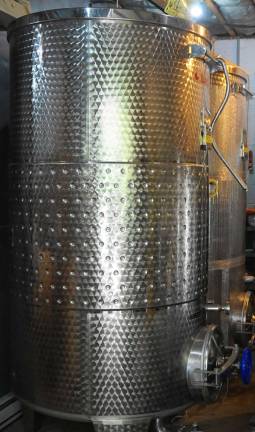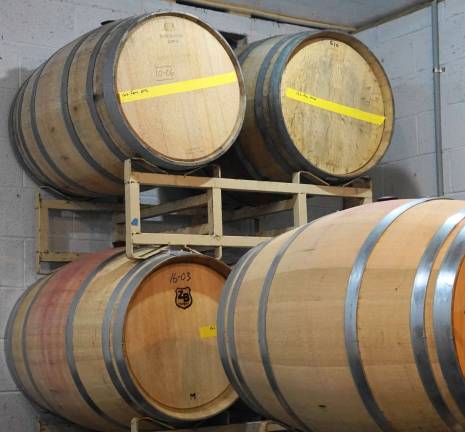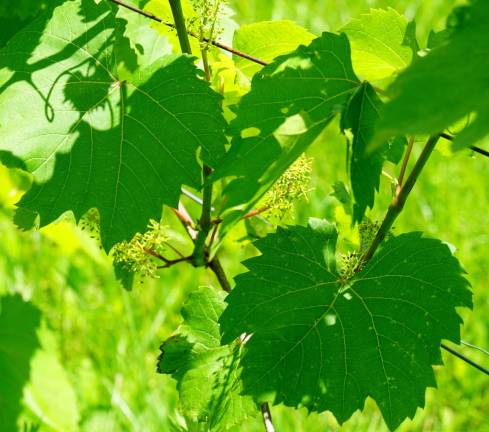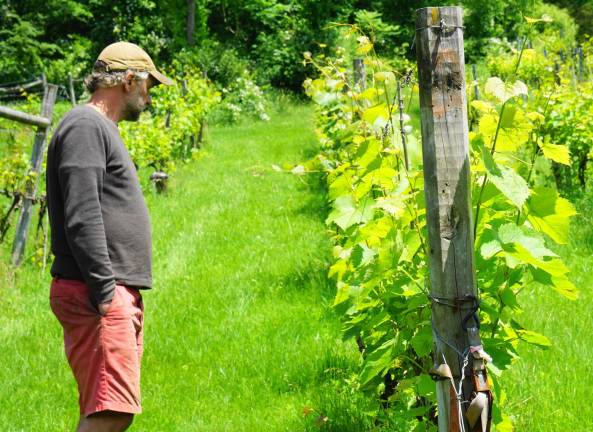Local winery to celebrate 10th anniversary




WANTAGE — The Wantage Ventimiglia Vineyard greets customers with joy and flavor in its pristine wine tasting room. Currently, they are the only Sussex County vineyard raising their own grapes and making wine.
Gene Ventimiglia, owner and head of business and sales, obviously loves people and family as his happy laugh echos throughout the room.
Gene shows a picture of his grandfather, Belgium - Dutch Edward Selis, driving his ice wagon for the Dundee Ice Company around 1916, portrayed on a bottle of wine and tells stories of his family near Salerno, Italy.
When he visited his family's home town, immediately someone called out, “Ventimiglia!” - meaning 20 miles – Gene said, because he looks just like his blue-eyed Italian family. His Italian relatives, of course, grow grapes, too.
Anne and Gene Ventimiglia purchased Rocky Ridge Farm in Wantage, named for its terrain, 25 years ago in 1993. Currently, it is a certified tree farm of 50 acres and four acres of grapes.
Gene has made wine since 1973 for family and friends. In 2002, along with current winemaker and son Anthony, they planted their earliest vineyards; were licensed and produced wine with their 2006 harvest; and released their first wines in July of 2008. In 2017, they won the “New Jersey State Fair American Wine Society Best of Show” with their 2013 red wine, “Fratelli Ventimiglia.”
In order to celebrate their upcoming 10th anniversary, they will hold a special open wine tasting event, including their new Cabernet Franc, Sat. and Sun., July 7 and 8, Noon – to – 5 p.m. For more information, see ventivines.com, 973-875-4333.
Anthony explained it is the in-between time at the winery as they prepare to bottle white wine from enormous multi-purpose vats. Other enormous wooden wine barrels line a wall for long-term storage of red wine, about a year and a half, and the white wines are stored for about one year. He added, “It's a lot of long-term planning,” as he takes care of the scientific and analytical side of winemaking.
He showed how high the white wine is within the vat saying, “About up to here. That's about 350 gallons,” of their “Buongiorno” white wine.
The multi-purpose vats are also used to ferment during fermentation season.
Gene continued, “We do a lot of things by taste. It's a little like cooking.” He said, the hard thing is when their sales increase; “We run out of wine.” Currently, they are out of two of their favorite wines, because those wines were made three years ago.
Anthony explained, in the wine making world, they call grapes white, gray, or black. Gray grapes actually look pink — Pinot Gris or Grigio. They both explained, they are very careful to make sure the wine comes out white.
Gene said, they produce mostly dry wines from yellowish green grapes.
In the vineyard, tiny green grape flowers just started to bloom. They are wind pollinated, Anthony said, and on a really calm day, one can actually smell the subtle smell of pollen up in the vineyard.
Anthony planted all the tiny cuttings, which take about three years before producing fruit. He explained, they learned how to overcome Japanese Beatles defoliating young vines; flocks of Starlings stealing hundreds of pounds of ripening fruit — nets help; and deer which love the really sweet little shoots and flowers on the vines — deer fencing surrounds their larger vineyard. In addition, they overcome the challenges of fungus, mildews, and molds.
They also found a new variety of grape bred by the University of Minnesota allowing for 40-below temperatures to survive Wantage winters and a shorter season to ripen.
Anthony said Wantage has more of a continental climate, with extreme cold and hot temperatures. Most wine growing regions prefer a more temperate area, he said, typically along the left coastal regions of the Mediterranean, like France, and along the warm air of the Pacific Ocean — unlike the Continental Jet Stream coming to the East Coast.
Wine grapes are grown in every state commercially, Anthony continued, except for Alaska and Hawaii, adding, grapes do not grow very well in tropical climates.
Gene concluded, “Wine is an interesting thing. Grapes want to be wine. It's just a matter of steering them in the right direction.”